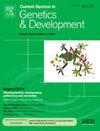Genetic disruption of nonsense-mediated mRNA decay in neurodevelopmental disorders
IF 3.6
2区 生物学
Q2 CELL BIOLOGY
引用次数: 0
Abstract
Nonsense-mediated mRNA decay (NMD) is a translation-dependent mRNA decay mechanism that serves the purpose of controlling both mRNA quality and quantity. As a quality control mechanism, NMD protects organisms against the deleterious effects of mRNAs that encode premature termination codons, which arise through either transcriptional errors or genetic variation. NMD is also employed as a major regulator of physiological gene expression levels, and complete knockouts of multiple NMD genes are embryonic lethal in model organisms. The identification of genes that contribute to human Mendelian disease has now highlighted that gene variants that impact NMD function contribute to a spectrum of neurodevelopmental disorders (NDDs). Here, we capture the current landscape of NMD genes and gene variants implicated in NDDs with a focus on recent discoveries. The survey highlighted the involvement of more than half of all NMD and NMD-related genes in NDDs, representing a significant enrichment. That compromised NMD is a likely convergent pathogenic mechanism across multiple genetic causes of NDDs warrants ongoing investigation into the role of NMD in brain development.
神经发育障碍中无义介导的mRNA衰变的遗传破坏
无义介导的mRNA衰变(NMD)是一种依赖于翻译的mRNA衰变机制,其目的是控制mRNA的质量和数量。作为一种质量控制机制,NMD保护生物体免受编码过早终止密码子的mrna的有害影响,这些mrna是通过转录错误或遗传变异产生的。NMD还被用作生理基因表达水平的主要调节因子,在模式生物中,多个NMD基因的完全敲除是胚胎致死的。导致人类孟德尔病的基因鉴定现在强调了影响NMD功能的基因变异会导致一系列神经发育障碍(ndd)。在这里,我们捕捉到NMD基因和与ndd相关的基因变异的现状,重点关注最近的发现。该调查强调了ndd中超过一半的NMD和NMD相关基因的参与,这代表了显著的富集。NMD受损可能是ndd的多种遗传原因的趋同致病机制,值得对NMD在大脑发育中的作用进行持续研究。
本文章由计算机程序翻译,如有差异,请以英文原文为准。
求助全文
约1分钟内获得全文
求助全文
来源期刊
CiteScore
7.90
自引率
0.00%
发文量
102
审稿时长
1 months
期刊介绍:
Current Opinion in Genetics and Development aims to stimulate scientifically grounded, interdisciplinary, multi-scale debate and exchange of ideas. It contains polished, concise and timely reviews and opinions, with particular emphasis on those articles published in the past two years. In addition to describing recent trends, the authors are encouraged to give their subjective opinion of the topics discussed.
In Current Opinion in Genetics and Development we help the reader by providing in a systematic manner:
1. The views of experts on current advances in their field in a clear and readable form.
2. Evaluations of the most interesting papers, annotated by experts, from the great wealth of original publications.[...]
The subject of Genetics and Development is divided into six themed sections, each of which is reviewed once a year:
• Cancer Genomics
• Genome Architecture and Expression
• Molecular and genetic basis of disease
• Developmental mechanisms, patterning and evolution
• Cell reprogramming, regeneration and repair
• Genetics of Human Origin / Evolutionary genetics (alternate years)

 求助内容:
求助内容: 应助结果提醒方式:
应助结果提醒方式:


